Who would have
thought that this quirky, controversial, though sometimes uneven
movie, District 9 could knock a tent pole picture like
Paramount's GI Joe: The Rise of Cobra off the top of the
charts after its first week? Besides being a classic science fiction
tale in the best sense of the term, it has two other charmed words
behind it – Peter Jackson. After complaining that there's a paucity
of fresh ideas coming out of Hollywood lately, the Oscar-winning
Lord of the Rings mastermind has put his imprimatur on
District 9. Nonetheless, this feature is thoroughly the creation
of 29-year-old South African-born writer/director Neill Blomkamp,
based on his 2005 short.
Twenty eight years before the "now" of this near-future thriller,
crustacean-like humanoids inhabit a vast galaxy-spanning spaceship
that appears in Earth's atmosphere. Not there to make formal first
contact, the "prawns" (as they become labeled) arrive here because
of some unexplained (at least to the humans) mishap that forces
their ship to hover motionless above Johannesburg. After some
debate, humans helicopter up to the ship and cut their way in to
find thousands of aliens starving and stinking up their vessel.
Relocated to Earth, they are crowded into a small neighborhood
called District 9 where, over the ensuing 20 years, it becomes a
shunned slum (a clear reference to District 6, the Johannesburg slum
created by the ruling Afrikaans as a ghetto for its Black
population). The obvious metaphor is there, made even more so, when
the South African government of this near-future's present decides
to re-locate the one million-plus "prawn" population to a decidedly
smaller, more isolated camp – in tandem with a corporation, MNU,
running the alien ghetto while secretly trying to tap them for their
technology and biology. Though humans and aliens can somehow
communicate – humans can sort of decipher their guttural clicks and
snaps (which sounds a bit like the real Xhosa language) – there's a
huge misapprehension and resistance by the prawns to their forced
move.
Applying a range of extrapolative techniques to explain this alien
society with its hierarchy of common citizens and elite
technologists, the film shows how they survive, and hope to cope
with post-20th Century South Africa world. Blomkamp does a good job
in delineating this complex alien culture as one of its scientists
plots to get them off Earth. Thrown into the mix is the Nigerian
criminal gang that exploits the perimeter of this ghetto and its
denizens – much like it happens in South Africa today.
While the film challenges expectation and grapples with first
contact, it humorously exposes human foibles in an oddly skewed
mirror-like fashion. It also offers a cool spaceship, funky aliens
and great weapons. Loaded with homages to tons of sci-fi images and
ideas, the film breezily makes its mark on this genre.
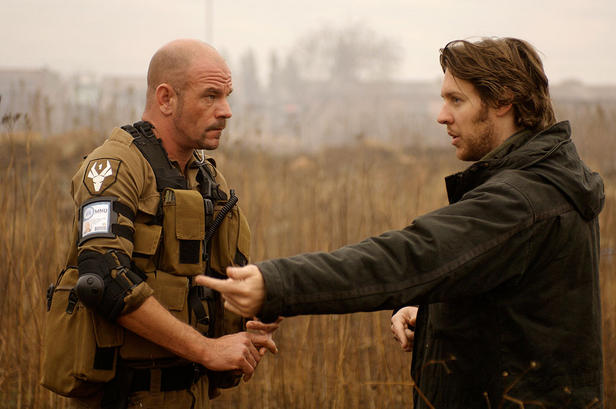 Why did you choose this direction for your first feature film
rather than make a more obvious, socio-political film about the same
issues?
Why did you choose this direction for your first feature film
rather than make a more obvious, socio-political film about the same
issues?
I grew up in Johannesburg. The genesis for the idea came out of the
fact that I just love science fiction and Johannesburg, so I wanted
to see science fiction mixed with Johannesburg. It didn't come about
like, "I want to talk about these issues that had an effect on me
when I was growing up, like segregation and apartheid and everything
else." The second you put something in Johannesburg, you start
raising these issues. Before [I thought of] District 9, I
felt like half of my mind wanted to make some serious film about
these topics and the other half wanted to make a bloody genre film.
Then I thought maybe I'll be able to do both. So there's never been
a second in my mind where it might have been set somewhere else,
because Jo’burg came first.
You focused on one character throughout the film – an MNU field
operative, Wikus van der Merwe (Sharlto Copley). Why did you
identify with him; is some part of him, you, or someone you know or
were taking the piss out of?
I was definitely taking a piss [British slang for making fun of
someone]. Afrikaners don't occur that often in movies, but when they
do, they're usually tough militaristic guys. They are the guys that
created the apartheid and stuff. So there's an image of what the
Afrikaans male is. The reality in Johannesburg is that lots of those
kind of guys work for massive state-owned companies, and are much
more bureaucratic, pencil-pushing dudes. I loved the idea of having
a guy who is comfortable in his life and with what his company was
doing, who always says "yes" to whatever the company asks for, and
genuinely believes it is in the best interest of everyone to do what
the company wants. It was awesome to take someone like that, who is
comfortable in their position, and have him turn into the thing they
are oppressing. It's mostly a satirical take on that kind of
character, which is what I like about District 9.
Do you find it amazing how alien South Africa is to most people?
I still don't have a good handle on how alien it is. Johannesburg is
weird, because half of it is like Los Angeles. It feels like just
wealthy parts of LA. But half of it is severe slummy, like Rio de
Janeiro or something. So it's kind of weird, because it's both
happening at the same time. Americans will easily understand the
company, the way it's being promoted, and most of the white parts of
South African culture. But it's the real bad place – the stricken
townships – that I didn't know how they would take. They may take
that as being very alien, but in the best-case scenario, they'll be
interested to see science fiction occurring in that setting.
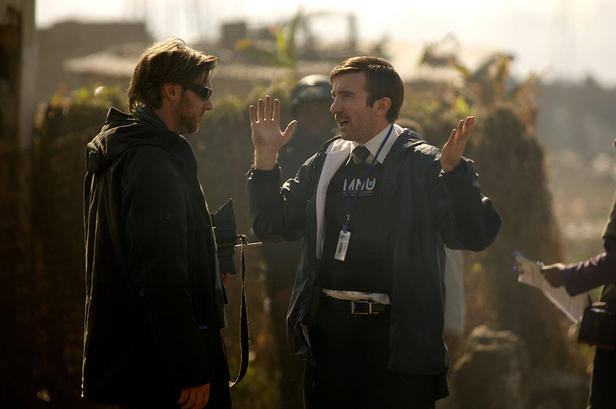 How much experience did you have with the townships? Where are
you living now?
How much experience did you have with the townships? Where are
you living now?
I left just before I turned 18. I went to Canada in 1987 – Vancouver
– so up until I moved at the end of grade 12, I had exposure to the
townships but it was limited. Maybe once every six months to a year,
I would be there for some reason. Then when I went to Canada, I
started going back to Johannesburg every year. That's when I got
seriously interested in it, and it was a very different type of
thing. I lived there when I was younger, and it was under apartheid;
when I was coming back from Canada it wasn't. It was more the stuff
you'd see on television, the way blacks were segregated, and you'd
see the armored vehicles going in – this oppressive thing that's
happening next door to me. It was almost society from a white kid's
point of view when I lived there. From 1997 onwards it was like
going in the townships, and then I became more and more interested
in it. I never viewed that interest as connected to science fiction.
That was just one part of my mind that was interested in this topic,
and the world of films was in another pocket of my mind and very
separate.
I see how alien your experiences are from even South Africa so I
thought the Nigerians added resonance. It seems you wanted to give a
deeper mythology to all three cultures: the South African, the
Alien, and then, adding the Nigerian to bring in a sort of African
point of view.
The Nigerian thing is there because I wanted to take as many cues
from South Africa as I could. I wanted South Africa to be the
inspiration. If I try to keep South Africa as true to South Africa
as I could, then, unfortunately, a massive part of the crime that
happens in Johannesburg is by the Nigerians there. It's just the way
it is. I wanted to have a crime group, and thought the most honest
refraction of a crime group would be Nigerians, for one. Then
secondly, the Muti, the African witch doctor, is also a huge part of
Africa and many African countries. So I wanted to incorporate that
as well. At the time I was writing the movie, there were all these
tribal witch doctor attacks on Albinos, because Albino flesh was
worth more than normal humans. That was the analogy to a different
group or a different race, [with their] traditional medicine, or
traditional Muti – even cannibalism, in some instances. I
incorporated aliens into that.
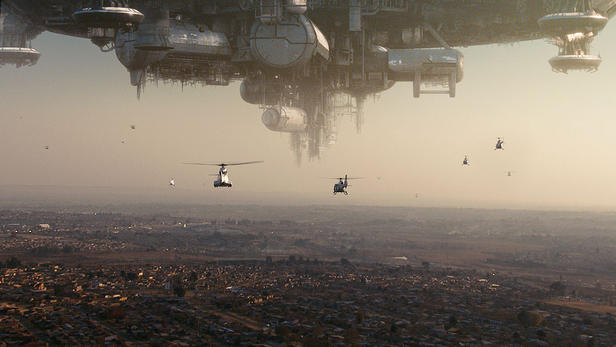 In a lot of literary science fiction, it doesn't operate
according to obvious, clichéd premises about first contact. By sheer
serendipity, a spaceship was damaged and ended up on Earth. I liked
that about your premise. You made it feel realistic because you
wanted us to accept the realness of it. It doesn't have to be a
fantasy.
In a lot of literary science fiction, it doesn't operate
according to obvious, clichéd premises about first contact. By sheer
serendipity, a spaceship was damaged and ended up on Earth. I liked
that about your premise. You made it feel realistic because you
wanted us to accept the realness of it. It doesn't have to be a
fantasy.
I wanted to make the most real feeling portrayal of impossible
elements that I could make. But it's still different from my actual
belief as to how first contact with aliens would go down, because I
wanted to make a movie, not a documentary.
Why does first
contact have to be in New York or Washington, especially given the
circumstances of your film? It doesn't have to occur in obvious
places such as Paris, or D.C. Why not come to Johannesburg? Why not
stop there by accident? This was more realistic than what we
intellectually envision in our head.
Maybe it is more realistic than what we're used to in Hollywood. But
still, in my opinion, it's opposed to reality. If some species were
able to make some kind of serious interstellar travel like that, or
intergalactic travel, they would be at a technological level where
there'll be a merging between [them] and [their] technology. It's a
lot like what humans will go through as well, provided we don't wipe
ourselves out. Whatever this race is, it would merge with their
technology at some point on their planet, and it would be a
biological, mechanical crossover, as scientist/writer Ray Kurzweil
puts it in The Singularity Is Near – and their society would
be altered after that point. There would be a new type of life.
Because they can exist in binary code, as an algorithm, or can
download themselves into whatever physical presence they want or
exist on computers, they can then determine how they want to travel
through space. They could occupy micro-starships and travel just
under the speed of light. They may have figured out
beyond-speed-of-light travel and gotten around theory of relativity.
They would come to our planet, for whatever reason, because they
chose to come here. There's no way that they would be a destitute
refugee group. The concept of xenophobia and us not being able to
accept them is also highly unrealistic, because we can only do that
with something that mimics the human form at a similar intelligence
level to us. It's difficult to apply racism and xenophobia to a
supercomputer. So I think it would be a completely different thing.
What were the greatest challenges you faced in making this film?
Obviously the special effects resonate; that's got to be CGI. Was
there any time you put people in outfits?
No. It was always digital.
With Peter Jackson on hand were you able to get the special
effects done more smoothly?
First of all, visual effects were done in Vancouver, Canada. Weta
[Jackson's effects company] did the spaceships. But the aliens were
all Canadian.
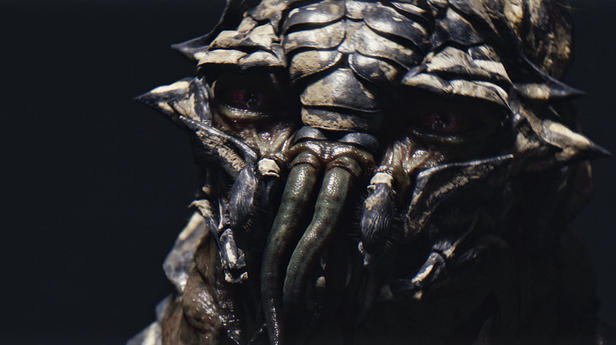 You must have had fun sketching out what you wanted to the aliens
to look like.
You must have had fun sketching out what you wanted to the aliens
to look like.
It actually wasn't that fun. It was kind of grueling. I had a
different design for about six months, and it was the one design
that I just didn't feel 100%. Then one day I realized that the ride
in reflected this insect hive and we were really dealing with lots
of the drone workers in the hive. So when I figured out that they
should reflect this insect biology in a way that they're
illustrated. Then we went down the road of making them more
insect-like.
You got the texture right. That must have made you nervous. Did
you test it, or when did you know it worked?
There's two parts to how you pull that stuff off. One part of it is
the way that it looks on a frame-by-frame basis, where, hopefully,
the goal is that it looks like a photograph and the way it's going
to tell what's real and what isn't. That's one part of it. The
second part is: how does that creature interact with the humans? And
how do the humans interact with it? That will be the thing that
either will make it work or not. So I used an actor who played
Christopher to play off Sharlto, and that meant I was filming those
scenes a little different to how you film two normal actors. The
process was that we would remove Jason Cope and replace him with
Christopher, and his performance would be crossed over to the
digital aliens, so both performances were organic and real. Once I
figured that process out, and we had this process where we would
remove Jason but capture the essence of his performance, I then
thought, "Okay, we're in a good place in terms of how these two
people are going to interact with one another," and that felt good.
Then, once you go into postproduction, you work with the effects
guys to get the most realistic results. I tried to set that up
beforehand – like I tried to make sure that the way I photographed
them a lot of the time would be in really harsh African sunlight.
That would make them feel more real. Then we had the insect-like,
hard-shell surfacing which would make it feel real as well.
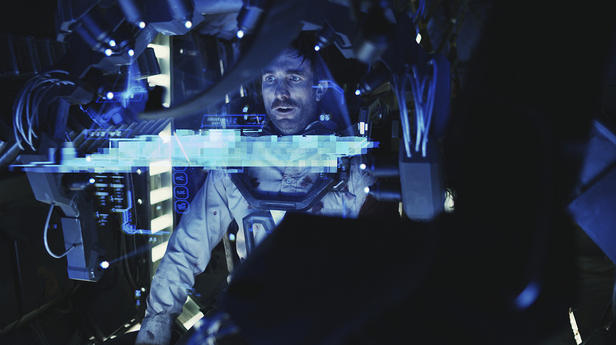 In writing the story, did you have some science fiction books or
films as a reference?
In writing the story, did you have some science fiction books or
films as a reference?
All of the science fiction in the film, the fantasy part of the
movie, is a distilled-down, melting pot of all the stuff that I like
in these genre movies [we all know]. But [for] the story itself and
the arc of Wikus' character and everything, I tried to use some of
Africa and Johannesburg for inspiration for a lot of that. It's
almost like reality provides the inspiration, so the science
fiction, is, in a way, was almost meant to be familiar. [It's] the
African setting that's unfamiliar.
Hopefully, when a writer or producer makes a science fiction
movie, they map out its internal logic so that things don't appear
inconsistent with the storyline.
I figured out their back-story and their way to the world: once
they've arrived here, like 28 years later, how that would work,
multi-national corporations getting involved, where they're getting
segregated off to. How the humans see them, how they see the humans.
That's all part of the set in the world, though, before you start
writing the story itself.
By locating the moment of first contact in a very specific place
it makes the story more resonant. Will audiences grasp the
alien-ness of the story and how the alien-ness of its location
enhances it?
That was the goal. Set it in an unusual place, and therefore make it
feel more real. So time will tell.
Email
us Let us know what you
think.